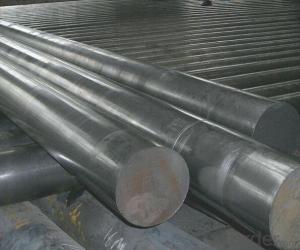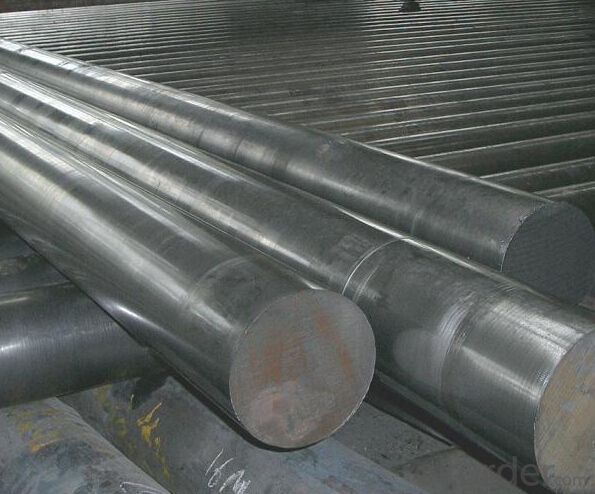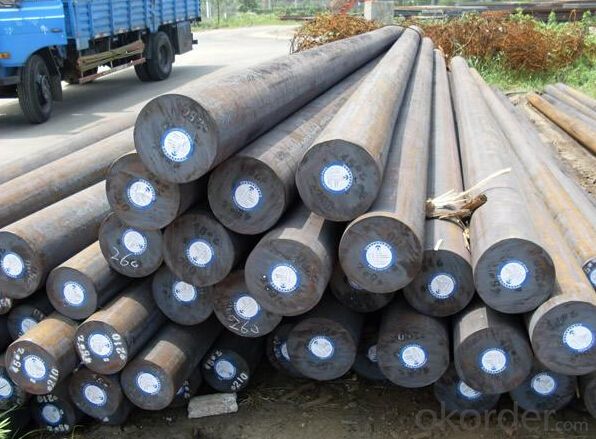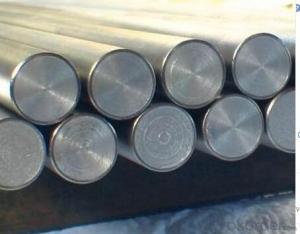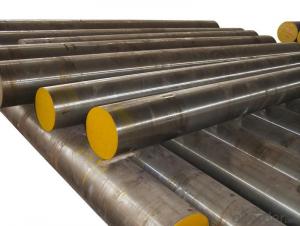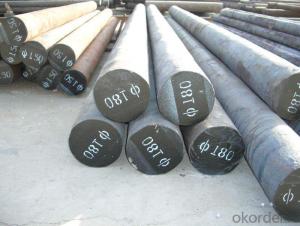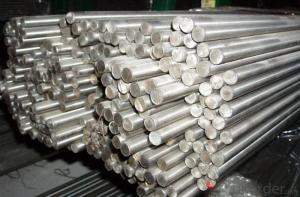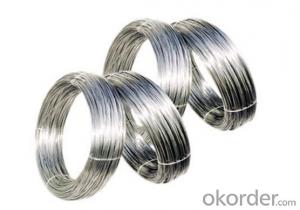Grade SAE51200/ GCr15 / 100Cr6 Bearing Steel Hot Rolled
- Loading Port:
- Tianjin
- Payment Terms:
- TT OR LC
- Min Order Qty:
- 3 m.t.
- Supply Capability:
- 10000 m.t./month
OKorder Service Pledge
OKorder Financial Service
You Might Also Like
Specification
Product Description:
OKorder is offering Grade SAE51200/ GCr15 / 100cr6 Bearing Steel at great prices with worldwide shipping. Our supplier is a world-class manufacturer of steel, with our products utilized the world over. OKorder annually supplies products to European, North American and Asian markets. We provide quotations within 24 hours of receiving an inquiry and guarantee competitive prices.
Product Applications:
Grade SAE51200/ GCr15 / 100cr6 Bearing Steel are ideal for structural applications and are widely used in the construction of buildings and bridges, and the manufacturing, petrochemical, and transportation industries.
Product Advantages:
OKorder's Grade SAE51200/ GCr15 / 100cr6 Bearing Steel are durable, strong, and resist corrosion.
Chemical Compositions:
Grade | AISI 52100, ASTM E52100, DIN 1.3505,JIS SUJ2, GCr15 |
| Length: 2000-13000mm or as required |
Shape | Round Bar |
Type | Alloy Steel Bar |
Delivery Condition | Black Surface |
Material | Bearing Steel |
Technique | Hot Rolled |
Packaging & Delivery of Bearing Steel
Mark: Heat No. will be cold stamped and Steel grade, diameter (mm), length (mm), and the manufacturer LOGO and weight (kg) is painted.
Standard seaworthy packing or as customer required
Delivery time: Within 30 days after order is confirmed.
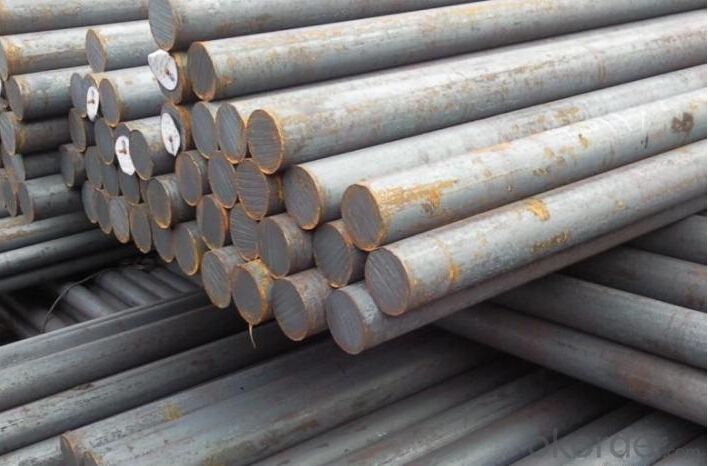
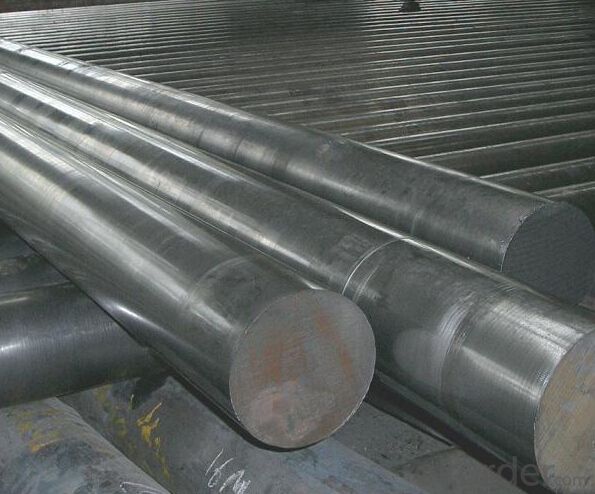
- Q: How are tool steels used in the manufacturing of cutting tools?
- Tool steels are widely used in the manufacturing of cutting tools due to their excellent hardness, wear resistance, and toughness properties. These steels are specifically designed to withstand high temperatures, intense pressures, and repetitive impacts during cutting operations. Tool steels are utilized to make various cutting tools such as drills, milling cutters, saw blades, and dies. They provide the necessary strength and durability required for cutting, shaping, and forming various materials including metals, plastics, and wood. Additionally, tool steels can be heat treated to further enhance their hardness and wear resistance, ensuring a longer lifespan and improved performance of cutting tools.
- Q: What are the different forging methods used for special steel?
- There are several forging methods commonly used for special steel, including closed die forging, open die forging, and ring rolling. Closed die forging involves shaping the steel between two dies, resulting in precise and intricate shapes. Open die forging involves deforming the steel without any restriction from dies, making it suitable for larger and simpler components. Ring rolling is specifically used for producing seamless rings by rolling a heated metal between two dies. These forging methods help in enhancing the strength, durability, and quality of special steel products.
- Q: How does special steel perform in abrasive environments?
- Special steel performs exceptionally well in abrasive environments. Its high hardness and resistance to wear make it ideal for applications where there is constant contact with abrasive materials. Special steel can withstand the impact and friction caused by abrasive particles, ensuring longevity and durability in such environments. Additionally, its corrosion resistance properties prevent the steel from deteriorating due to exposure to moisture or chemicals commonly found in abrasive environments. Overall, special steel is specifically designed to excel in abrasive conditions, providing optimal performance and reliability.
- Q: How does special steel compare to other materials like aluminum or titanium?
- Special steel, such as stainless steel or tool steel, offers several advantages over materials like aluminum or titanium. Firstly, special steel generally exhibits higher strength and hardness, making it ideal for applications requiring durability and resistance to wear. Secondly, special steel possesses excellent thermal conductivity, allowing it to dissipate heat more efficiently compared to aluminum or titanium. Additionally, special steel is often more cost-effective and readily available in comparison to titanium. However, aluminum and titanium are known for their lightweight properties, making them preferable for applications where weight reduction is crucial. Ultimately, the choice between special steel, aluminum, or titanium depends on the specific requirements and constraints of the intended application.
- Q: How does special steel contribute to energy efficiency?
- Special steel contributes to energy efficiency in several ways. Firstly, special steel alloys are often used in the manufacturing of energy-efficient appliances, such as refrigerators and air conditioners. These steel alloys have enhanced heat transfer properties, allowing for more efficient cooling and heating processes, thereby reducing energy consumption. Secondly, special steel is commonly used in the construction of energy-efficient buildings and infrastructure. Its high strength and durability enable the creation of lightweight and sustainable structures, which require less energy for heating, cooling, and maintenance. Moreover, special steel plays a crucial role in renewable energy technology. It is used in the production of wind turbines, solar panels, and hydroelectric power plants, enhancing their efficiency and overall performance. The unique properties of special steel, such as corrosion resistance and high tensile strength, make it ideal for withstanding harsh environmental conditions and maximizing energy generation. In summary, special steel contributes to energy efficiency by enabling the development of energy-efficient appliances, constructing sustainable buildings, and optimizing renewable energy technologies. Its utilization in various industries helps reduce energy consumption and promote a more sustainable future.
- Q: How is special steel classified based on its mechanical properties?
- Special steel is classified based on its mechanical properties by considering factors such as tensile strength, hardness, toughness, and ductility. These properties determine the steel's ability to withstand various types of stress and deformation, making it suitable for specific applications in industries such as automotive, aerospace, and construction.
- Q: What are the main characteristics of heat-resistant steel?
- Heat-resistant steel, known as high-temperature steel as well, is an alloy with specific properties that enable it to endure extreme temperatures without sacrificing its mechanical strength and integrity. The primary features of heat-resistant steel are as follows: 1. Thermal fatigue resistance: Heat-resistant steel is designed to endure cyclic heating and cooling without developing cracks or fractures. This characteristic allows it to maintain its structural integrity, even in environments with rapid temperature fluctuations. 2. Exceptional creep resistance: Creep refers to the gradual deformation that occurs in a material when exposed to high temperatures over an extended period. Heat-resistant steel exhibits exceptional resistance to creep, ensuring that it retains its shape and strength even under prolonged heat exposure. 3. Preservation of mechanical properties at elevated temperatures: Unlike regular steel, which experiences a significant reduction in strength and hardness at high temperatures, heat-resistant steel retains its mechanical properties even under extreme conditions. This property makes it suitable for applications in industries such as aerospace, power generation, and oil and gas. 4. Resistance to oxidation and corrosion: Heat-resistant steel possesses a high resistance to oxidation and corrosion at elevated temperatures. It forms a protective oxide layer on its surface, preventing the underlying material from being attacked by oxygen or other corrosive elements. This property enhances the longevity and reliability of components made from heat-resistant steel. 5. Excellent thermal conductivity: Heat-resistant steel exhibits outstanding thermal conductivity, allowing it to efficiently transfer heat away from its surface. This feature proves particularly beneficial in applications where heat dissipation is crucial, such as in heat exchangers and furnace components. 6. Minimal thermal expansion: Heat-resistant steel has a relatively low coefficient of thermal expansion, meaning it expands and contracts minimally when subjected to temperature changes. This characteristic ensures dimensional stability and reduces the risk of warping or distortion under thermal stress. In summary, the main characteristics of heat-resistant steel make it an ideal material for applications that involve exposure to high temperatures, such as furnace components, exhaust systems, gas turbines, and heat exchangers. Its ability to endure extreme heat while maintaining its structural integrity and mechanical properties make it a critical material in industries where temperature resistance is of utmost importance.
- Q: How long does special steel last compared to regular steel?
- Due to its unique composition and properties, special steel tends to have a longer lifespan than regular steel. Regular steel primarily consists of iron and carbon, while special steel is alloyed with elements like chromium, nickel, and molybdenum to enhance its strength, hardness, and resistance to corrosion. The lifespan of special steel is influenced by factors such as the specific type of steel, its usage conditions, and maintenance practices. However, in general, special steel has a significantly longer lifespan compared to regular steel. It exhibits greater resistance to wear and tear, corrosion, and high temperatures, making it suitable for demanding applications and environments. Industries such as aerospace, automotive, and construction extensively utilize special steel for critical components like engine parts, structural elements, and cutting tools. These components often endure high stress, friction, and exposure to harsh conditions. Special steel's exceptional properties enable it to withstand these challenges and maintain its performance for an extended period. Furthermore, special steel undergoes rigorous testing and quality control measures during its manufacturing process. This ensures that it meets specific industry standards and can endure extreme conditions without significant degradation. In contrast, regular steel may not possess the same level of durability or longevity. In conclusion, special steel generally lasts longer than regular steel due to its enhanced properties and resistance to wear, corrosion, and high temperatures. Although the exact lifespan may vary depending on various factors, special steel's superior characteristics contribute to its prolonged durability.
- Q: What are the properties of magnetic steel?
- Magnetic steel possesses several properties that make it suitable for various applications. It exhibits ferromagnetism, meaning it can be magnetized and holds a magnetic field strongly. This property enables it to attract and repel other magnetic materials. Magnetic steel also has high permeability, allowing magnetic flux to pass through it easily. It has a high saturation magnetization, meaning it can hold a strong magnetic field. Furthermore, magnetic steel demonstrates excellent mechanical strength, durability, and corrosion resistance, making it ideal for use in industries such as electrical engineering, automotive, and construction.
- Q: How does special steel perform in terms of magnetic permeability?
- Special steel typically has low magnetic permeability, meaning it does not easily allow the flow of magnetic fields through it. This property makes it suitable for applications where magnetic interference needs to be minimized or controlled, such as in electrical transformers or magnetic shielding.
Send your message to us
Grade SAE51200/ GCr15 / 100Cr6 Bearing Steel Hot Rolled
- Loading Port:
- Tianjin
- Payment Terms:
- TT OR LC
- Min Order Qty:
- 3 m.t.
- Supply Capability:
- 10000 m.t./month
OKorder Service Pledge
OKorder Financial Service
Similar products
Hot products
Hot Searches
Related keywords
